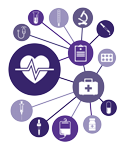May 20, 2022
Update in Medical-Surgical Nursing 2021: All Topics
 Update in Medical-Surgical Nursing 2021 | All Topics
Update in Medical-Surgical Nursing 2021 | All Topics
On-Demand Program
Course Description
The medical-surgical setting today presents unique, complex and varied patient care challenges. This program is an opportunity to review and update your medical-surgical clinical practice and acquire new assessment and management strategies. Healthcare professionals are invited to advance their knowledge of evidence-based practices that promote care innovations, collaboration and confidence among team members. Teaching methods include PDF handouts, lecture video, discussion, and case study analysis.
Target Audience
For healthcare professionals including staff nurses, clinical nurse leaders, clinical nurse specialists, nurse practitioners, nurse educators, managers, administrators, social workers and other interested healthcare providers.
Objectives for Learning Outcomes
At the conclusion of the conference, you will be better able to:
- Define trauma and its impact on the brain.
- Identify type of tracheostomy tube, indication, and any equipment that should be available for daily and emergency use.
- Understand renal function basics and statistics.
- Identify insulin regimens, including basal-bolus, correctional, and insulin drips, used in the acute care inpatient setting.
- Identify ARDS stages.
- Describe how fostering a ‘Culture of Wellbeing’ impacts patients, families and the professionals who care for them.
- Describe prevention intervention to avoid perineal skin breakdown.
- Describe new continuing competency requirements and enforcement.
- Define and understand the pathophysiology of obstructive sleep apnea.
- Understand basic EKG/telemetry analysis of atrial fibrillation, afib with RVR.
- Identify proactive interventions to limit escalation of vulnerable patients.
- Name three interventions that can contribute to SSI prevention.
- Discuss hazardous drug safety for non-oncology nurses.
- Understand the relationship of preparation of the patient for surgery and outcomes.
Featured Topics
- Shifting Our Focus: Understanding Trauma-Informed Care – Cheri Constantino-Shor, MSN, RN, CMSRN, CRNI
- Breathe Easy: Tracheostomies are Secure Airways – Rebekah Marsh, BSN, RN, CCRN-K
- Updates in Renal Care – Cate O’Leary, DNP, ARNP
- Glycemic Control in the Acute Care Setting (Rx) – Lucy Greenfield, MN, RN, CCRN-CMC
- ICU Considerations for COVID-19 Acute Care Patients – Jennifer Okimoto, RN
- Transforming Culture through Resiliency and Teamwork – Julie Rose, CHSE
- Skin Breakdown in Perineal Region: Prevention – Colleen Karvonen, MN, RN, CMSRN, CWON
- Scope of Nursing Practice: Did COVID Change Nursing? – Paula Meyer, MSN, RN, FRE
- Sleep Apnea: Inpatient Considerations – Preetam Bandla, MD
- Management of Atrial Fibrillation with RVR in Heart Failure – Emily Krengel, DNP, ARNP
- Introduction: A Bedside Report – Proactive De-escalation Skills – Ben Longstroth, MBA, MS, RN
- What Infection Prevention Wishes Every Med-Surg Unit Knew About Preventing SSIs – Jeanette Harris, MS, MSM, MT(ASCP), CIC, FAPIC
- The Care of the Cancer Patient for Non-Oncology Nurses – Kelley Blake, MSN, RN, AOCNS, NPD-BC
- Feeling Safe: Structuring Your Work to Create an Environment of Safety – TJ LaRocque, BSN, RN